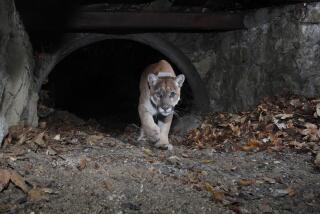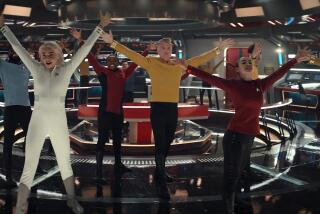Music for a Stellar Generation : Space: ‘The Planets’ expressed awe and mythology; where is the symphony to accompany us into the future?
- Share via
Gustav Holst began writing “The Planets” in 1914. Its first performance, five years later, was a symphonic celebration of planets Mercury through Neptune (Pluto wasn’t discovered until 1930). The music is beautiful and grand--but something is lacking. Despite its variety, there is no human adventure. The planets, in those days, were still “gods”--remote, aloof in a separate, self-contained universe, hermetically sealed from human interaction or contamination. The solar system was a very large and inaccessible place for mortals.
Now another piece of music has played out; the last note of Voyager’s Neptune encounter fades into the vacuum as the spacecraft departs our solar system, to be succeeded in the public mind by the discordance of the Bay Area earthquake and Eastern European upheavals. But we come not to bury Voyager; rather to praise. The brief encounter with Neptune was not an ending but a prelude to a larger quest and a longer symphony.
After Voyager, the gods no longer reign. The planets belong to humankind.
The outer planets and their satellites were but tiny, pretty baubles in our skies before Voyager’s flight to Neptune and beyond. Now they are worlds in their own right, concrete and beautiful in their gargantuan presence.
Gustav Holst was born too early. How was he to know the adventure of the planets and man’s place among them? There was no way then to experience, even vicariously through the eyes of a Voyager, the pastoral solitude of interplanetary cruising; the rolling, thundering crescendo of planetary encounter.
I imagine him looking over our shoulders, following Voyager across the sky. NASA’s Goldstone antenna, a white leviathan in the center of an empty desert stage, glows in a fading twilight, hard bright stars overhead, the silence of the horizon dropping away into pink-gray distance. Why is it that this sight and silence seems so much like music? Gustav, are you listening? Can you hear the slow-motion turning against the sky?
It’s time for a new musical genius to bring us a modern symphony of adventure among the planets, of man’s place among the gods. Let us hear the chaos of departure from Earth’s surly bonds, the basso profundo of planetary encounter. It’s time for that symphony, and I hope someone will write it, because it is the beginning of a story of human drama of Wagnerian proportion. It will help to tell us where we are and where we’re going.
And where is that? “To the supermarket,” some will say. “My feet are firmly planted on Earth, and I’m going to work, I’m going home, I’m going to the hospital to visit a friend. I need to tend my garden.”
Worthy activities, but our children, or perhaps our grandchildren, are going to live in space. The urge to explore and expand is inborn. We are going, sooner or later, because we have no choice. Cast aside any debates about manned versus unmanned space exploration. They are irrelevant.
As a species, we will begin by colonizing the solar system. We will break ourselves--bodies and spirits--on new shores, and we will regroup and plunge again, groping for dry land. Careers will be spent, lives lost in the quest. Music will help us mend, and drive us forward again.
Many will not share our enthusiasm--will not want to assume the hardships of pioneering. They are the equivalent of the Europeans who stayed behind, concerned with the problems of the Old World while explorers looked to the new.
Let them be. Very few will be able to go, anyhow. We will need their help, a large home base for support while we explore and settle, until we are independent. And what will explorers do for our homeland, our mother Earth at that time? Probably the same thing that the United States of America did for England in 1776. Children have no responsibility to their parents; only to the children that follow.
Voyager represents the beginning of a magic age. Its goodby to Neptune is our hello to the solar system. The journey will begin with small steps: footprints on Mars, new ones on the moon. Every step will be hard-fought, but eventually we will inhabit most of the solar neighborhood. At that point, we’ll begin to get restless again--we’ll turn up our music and consider how to follow Voyager on a questing note, a trip to the stars.
More to Read
The biggest entertainment stories
Get our big stories about Hollywood, film, television, music, arts, culture and more right in your inbox as soon as they publish.
You may occasionally receive promotional content from the Los Angeles Times.










